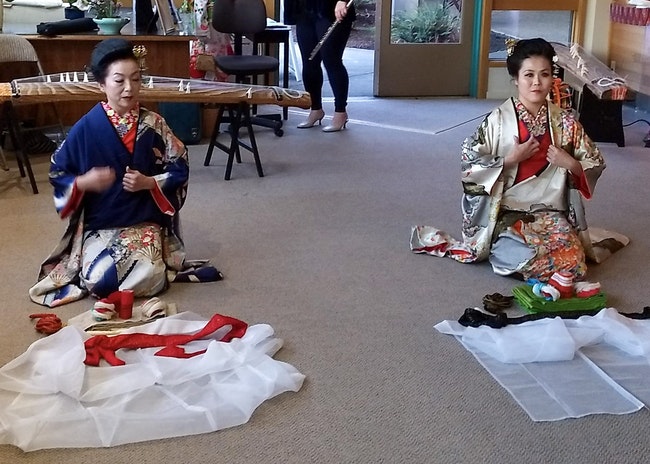 Women perform kitsuke, a traditional dance that demonstrates the art of wearing a kimono, during the opening of the “Windows to Japan” exhibit on Wednesday, March 4, at the World Beat Gallery. (Mary Louise VanNatta/Special to Salem Reporter)
Women perform kitsuke, a traditional dance that demonstrates the art of wearing a kimono, during the opening of the “Windows to Japan” exhibit on Wednesday, March 4, at the World Beat Gallery. (Mary Louise VanNatta/Special to Salem Reporter)
Museums, theaters and other cultural institutions in Salem could face long-term or permanent closures without relief funding after months with little or no revenue.
A report from Oregon Cultural Trust released last week found organizations around the state faced a bleak future, with closures and cancelled events still decimating revenue as federal relief options have largely run out.
In Salem, the survey included Gilbert House Children’s Museum, which reported without relief funding “we will have to close our doors and lose the investment of our community over 30 years,” according to a news release from the Cultural Trust.
In Marion County, 19 surveyed organizations reported losing more than $1.5 million in revenue from COVID-19 impacts and 72 full-time employees, said Brian Rogers, the Cultural Trust executive director.
The trust is a state organization established to support arts and culture in Oregon, funded by voluntary contributions from Oregon taxpayers, who receive a credit.
“Organizations have on average two to three months of reserves which, if you do your math, it’s pretty much running out now,” said Rogers. “If they don’t start to gain some support, things are going to get really tough (in) late summer, early fall.”
The trust has a permanent fund of $29 million that acts as an endowment for the organization. Leaders have proposed setting aside $10 million from that fund to establish a relief program for Oregon arts and culture organizations, but that spending needs legislative approval.
Gilbert House promotions coordinator Samantha Bowdoin said the nonprofit’s leaders did not want to want to be interviewed about the survey. Other Salem-area organizations said they’re not on the verge of closure, but struggling as federal relief efforts have run out.
“We’re tiny. We’ve always been on a shoestring,” said Kathleen Fish, executive director of the Salem Multicultural Institute, which runs the annual World Beat festival in June.
This year is the first the institute has canceled the festival since its beginning in 1998, Fish said. The festival provides about 60% of the organization’s revenue for the year, allowing them to run a year-round gallery focused on diverse cultures.
Fish said the institute applied for and received federal paycheck protection loans, a relief effort allowing businesses and nonprofit organizations to keep people employed during pandemic-related closures. But that money has now run out, and she said while she’s optimistic about the festival’s future, relief would help keep the organization afloat, especially at a time when many regular donors are also struggling.
“We haven’t wanted to ask for money because there have been more important needs – food, housing – that are connected to the pandemic,” she said.
Rogers said arts and cultural organizations have been especially vulnerable during the pandemic. Gov. Kate Brown’s March 23 executive order required museums and art galleries to close their doors and also restricted events outside the home, a significant source of revenue for many groups that lease historic homes or galleries for parties and weddings.
A Business Oregon survey conducted over the first two weeks of April 2020 found 82% of arts, entertainment and recreation businesses expected to lose over half their revenue in April, a higher percentage than any other industry except hotels and accommodations.
Rogers said the impacts have been unlike any previous economic downturn. During the Great Recession, organizations had time to prepare for lost revenue, and people still went out and held weddings and receptions.
“This was like a light switch. No one saw this coming,” he said.
Adding to the challenge, many arts organizations were ineligible for federal relief because of their small size and lack of paid employees, or could not complete the application because it was too complicated or confusing, he said.
Willamette Heritage Center also received paycheck protection loans and has used reserve funding, donations and grants to weather two months of closure.
Executive director Michelle Cordova said they’re in a better position than many nonprofit organizations because the Heritage Center includes shops with regular tenants and is currently open with modified hours for smaller groups. But with federal relief money running out, she’s now having to cut staff hours by about one-third and said the depletion of reserve money is a concern.
“More support would certainly be very welcome. I would hate to come out of this at the other end with literally nothing in the bank,” she said.
Cordova said her largest concern is that smaller cultural organizations may emerge from the pandemic unable to weather a downturn in revenue or unexpected expenses.
“What worries me is that some of these nonprofits will get through this and then a year later they’ll have to fold,” she said.
SUPPORT SALEM REPORTER’S JOURNALISM – A monthly subscription starts at $5. Go HERE. Or contribute to keep our reporters and photographers on duty. Go HERE. Checks can be sent: Salem Reporter, 2925 River Rd S #280 Salem OR 97302. Your support matters.
Contact reporter Rachel Alexander: [email protected] or 503-575-1241.









